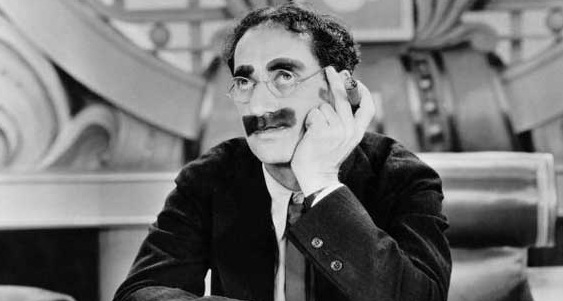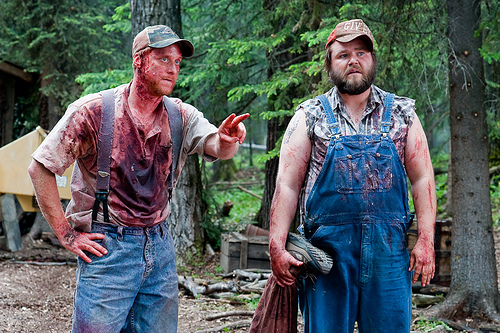I’ve never seen any of the Marx Bros. films. That makes me, I’m aware, a really fucking awful human being…and an even worse fan of both film and comedy. I’ve seen them in other things, and in the most famous clips that end up embedded in documentaries and retrospectives, but I’ve never sat down and watched one of their films wall-to-wall.
For that reason, I can’t provide much context about Duck Soup, nor can I really say that it is or isn’t representative of the Marx Bros. canon. What I can say, though, is that I was sincerely taken aback by just how modern this film felt.
It’s a political satire, at least ostensibly (more on this in a moment), but structurally it’s just a series of disconnected moments and set pieces. There’s nothing wrong with that, but it’s interesting how much lazy comedy this sort of approach has given birth (and berth) to since.
When it comes to screwball comic nonsense, films justified by the laughter each scene or moment brings as opposed to any grand statements or emotional journeys they might otherwise provide, we’re currently in the glut of dreck like Scary Movie XXIV or Meet the Spartans, and for a long time I felt that their lame pedigree was unwittingly set into motion by things like Airplane! and Kentucky Fried Movie…but no. In 1933, the Marx Bros. were doing it already.
Duck Soup is full of bizarre cinematic collisions, with a hilariously unlikable Groucho Marx as man who, for whatever reason, holds an entire country in sway with his charm, so much so that they feel compelled to literally sing his praises while he gloats about how many minor things he’d have them shot for doing. He speeds his country to war for the sake of an insult he can’t remember, and brings at least one entire nation to utter ruin. During the course of these things there are several musical interludes, lots of irrelevant wordplay, silent physical comedy, and a dispute between peanut vendors and lemonade vendors.
Not one thing follows logically from the last, and the conclusion of the film blindingly assaults cinematic flow at its core by cutting bluntly many times from one scene to an identical scene in which the characters are now in different costumes, or the insertion of stock footage from other films suggesting that soldiers, natives and animals are all rushing to the front lines to assist in Groucho’s war. It’s meta before we had a word for it. It’s the Tristram Shandy of screwball comedy. We can thank this movie for The Naked Gun. We can also blame it for Family Guy.
Which, actually, kind of disappoints me. Of course, it’s disappointing me in a very effective way, but I think I expected more from an important group like the Marx bros. I expected…I don’t know. A certain quiet dignity behind the proceedings — especially in a work of satire — or a sense of cultural weight. Instead it spins its wheels in an effort to squeeze every possible pun and reedle (to borrow Joyce’s term) from a scene. Plot points are hurried past or brushed over, so that we can watch Harpo wrestle with an uncooperatively loud radio, or Groucho have a showdown with someone pretending to be his reflection.
It’s strange for the sake of being strange, and there’s nothing wrong with that. But I do wonder if this actually qualifies as satire. While the unwillingness to admit weakness leads directly to war (as it does in later, clearer satires such as Dr. Strangelove or In the Loop), I think people consider this to be satirical simply because it mentions politics…rather than because it really makes any statement about them.
After all, it’s just a series of things that happen. The mirror scene is great (though I actually first encountered its recreation in I Love Lucy) and there’s a masterful rhythm to the wordplay…but satire? I honestly don’t see it. If a film were marketed as, say, a satire about office life, people would be disappointed if the film — however funny it might be — didn’t actually say anything about office life.
When it comes to politics, though, I guess it’s easier to just assume everything fits. The lemonade vendor flips over the peanut cart? Sure, we can just assume that makes some kind of political statement. Three people dressed as Groucho run around a mansion in the middle of the night? Yeah, I guess politicians do impersonate those we’d most like them to be…
Remove the political context and you’re just left with a series of jokes that don’t work any less well without it. I enjoyed the film, certainly, but it doesn’t feel satirical to me. It feels like some very talented people coming together to have a laugh. Do we really need to assign a political motive to that?
Next up: another movie.

